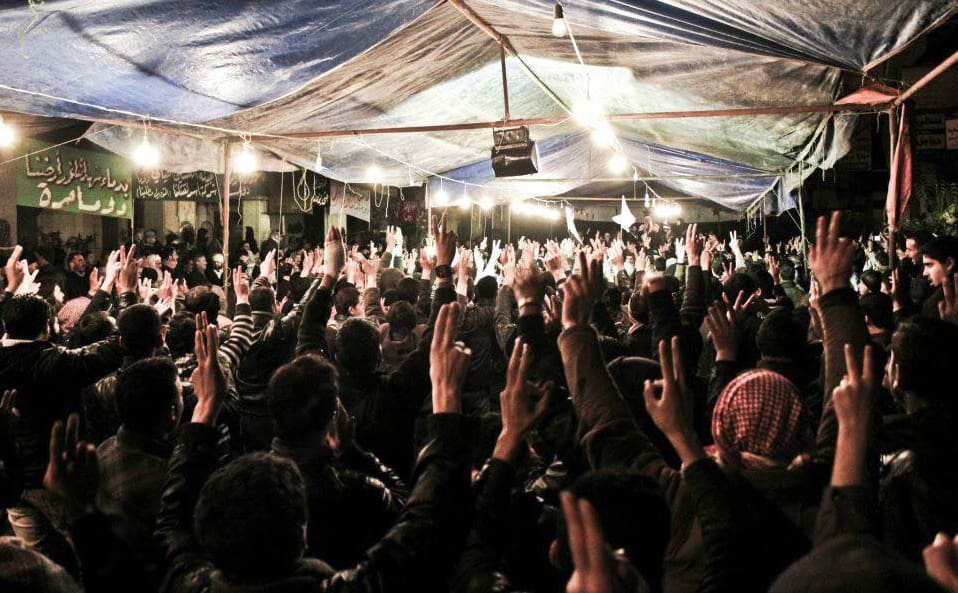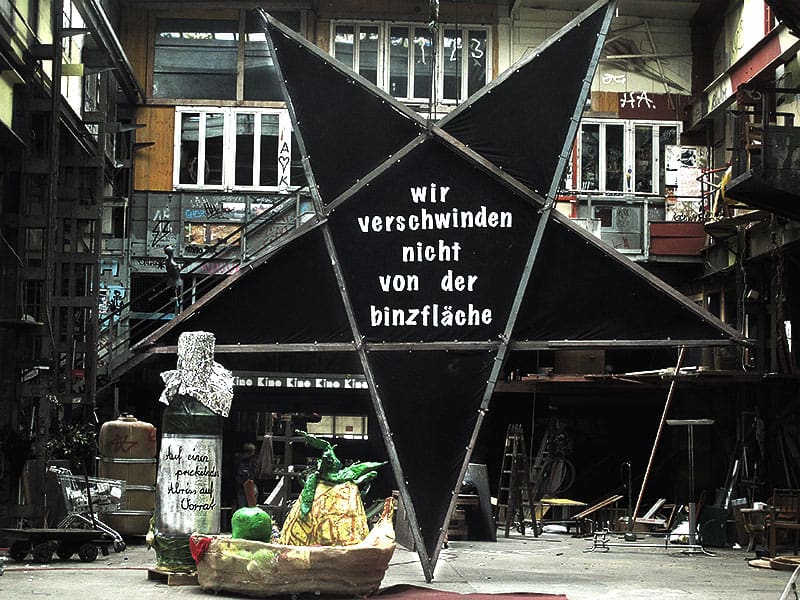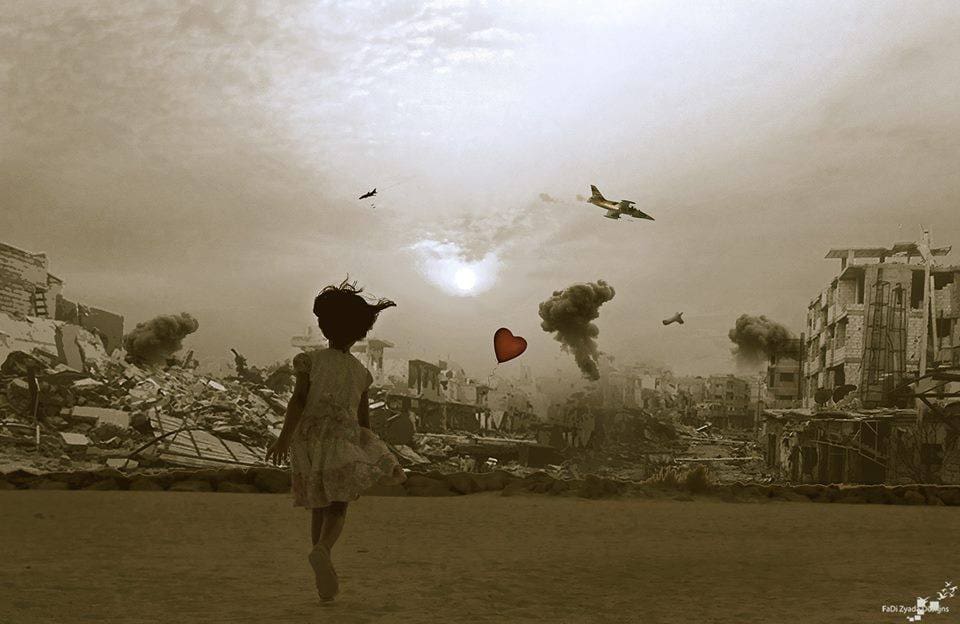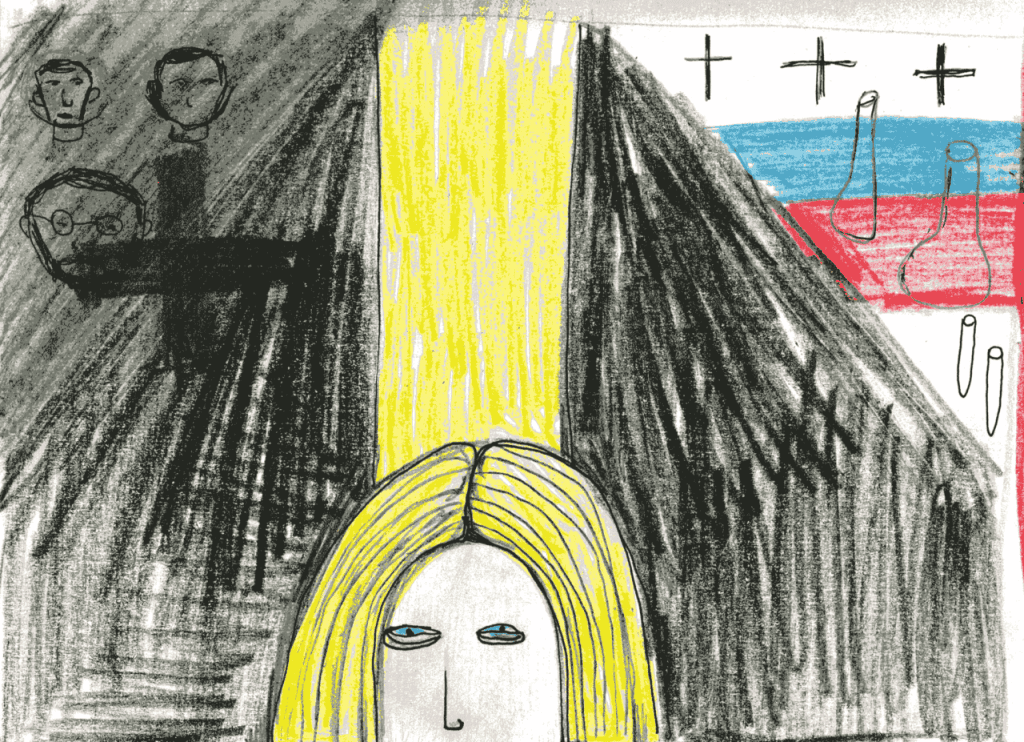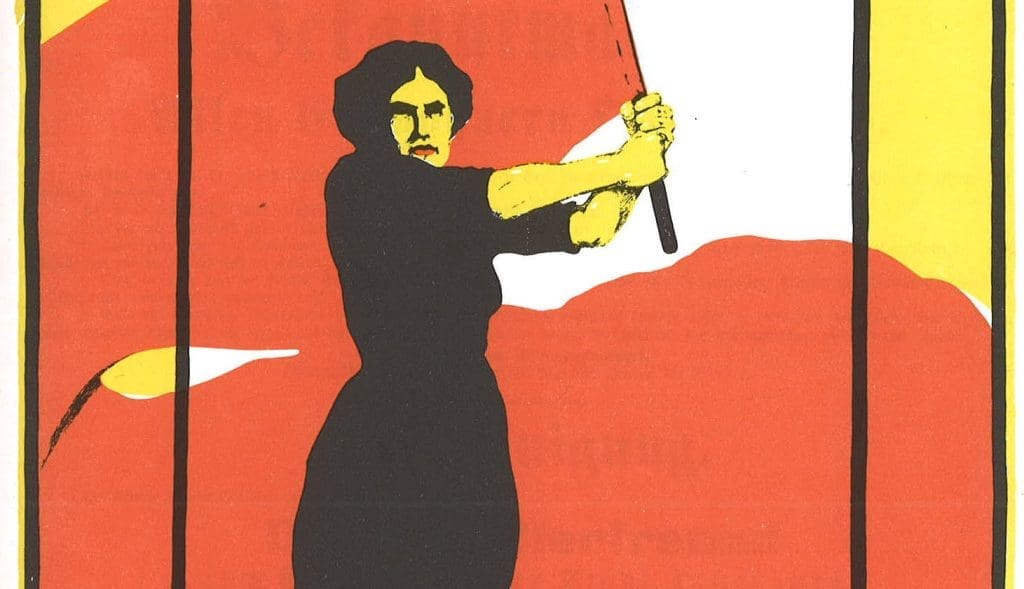We Retain the Dignity of the Revolution
by Marcell Shehwaro
14 April 2018 (originally posted on Facebook)
What if we accept Bashar al-Assad?
Let’s discuss, “peacefully,” that “elephant in the room,” as you say: What if we accept that Assad remains in power?
We are asked this question, sometimes obliquely, sometimes filtered through the closed circles that decide on Syrian affairs without the attendance of any Syrians. Sometimes it is brought up in ways that infantilize us, as if we are children who don’t dare to confront the “truth,” “realistically.”
In the harshest times, this question is posed to us as a negotiation over the bodies of our children. The answer to why we don’t accept that Assad remains in power is obvious: he killed our children, and the scars of their smiles are etched on our hearts. The blackmailing question becomes: He will kill your children and their smiles, why don’t you just accept him?
Excuse us for a moment! We need some time to understand this world’s logic, the world ruled by Trump, Putin, and a bunch of politicians who only care about their four-year period in office.
Hafez al-Assad has blocked us from the outside world. Now his son follows in his footsteps. The liberationists among us gazed towards the United Nations charters and the Universal Declaration of Human Rights. Some of us believed that those charters meant something. When the revolution broke out, we discovered that those charters are ruined due to their misuse by members of the UN’s Security Council.
Apologies for the digression. So: Why don’t we accept Assad?
We wish to tell your people the “harsh truth.” We want to challenge your empty words and courtesy rhetoric. We know you mean nothing when you say things like: “using chemical weapons is a red line,” or “Aleppo is a red line,” or “Assad lost his legitimacy.”
The truth is that Assad is more your ally than the naïve group of dreamers that we are, believing like we do in democracy, justice, and accountability.
Isn’t this the message of bombing in Idlib and Ghouta today? To convince us, “gently,” to accept a political solution—the only solution that you lectured us about—as we are being killed?
You say that we are defeated. Well, gentlemen, I and my group of friends never imagined, as we hid from the bullets shot at our peaceful demonstration, that we could defeat Russian planes all by ourselves. We never thought that we could win the “war” while we were being tortured, or suffocated by chemical weapons, or destroyed by shelling, rape and detention.
It may be true that we have lost. But this defeat made me aware of something I never wanted to know.
I know today the terminology of violence: The Golan cluster bombs, the difference between sarin and chlorine, and the new version of bunker-buster that can destroy our “safe” basements. I learned even how to pronounce these words in English.
You say we were defeated in Sochi! We were not even at Sochi. Sochi was the costume party that gathered the regime himself with you. You have all our sympathy for the time you are forced to spend with them.
I keep digressing away from that nightmare, Bashar Assad’s ruling Syria, excuse me!
What if we “accept” that Bashar al-Assad stays in power? First, who are “we”? In the cities that are besieged and bombed, we are the people who must cross a thousand barriers to visit one another. Who are “we”? We are the refugees who fail to have a proper family reunion. Or need an official permission to breathe.
And if some of us actually accept Bashar al-Assad as president, what can we do with all those of us who are “rude” enough to reject giving up their dignity? What can we do with all those who still believe in their right to their homeland? What if mothers who buried their sons refused to believe that justice had died also? We have to let them die.
So the suggestion is that some of us surrender, so that others die in silence. Or maybe we can give you the names and coordinates of all those who oppose Bashar al-Assad, so that you and your Russian friends can ensure their disappearance?
What if some of us actually accepted that Bashar Al Assad stays in power—do you guarantee that the war will stop? That the brutal dictator won’t celebrate his victory with the taste of our defeated blood?
You say that you want him to stay for a transitional period. Funny joke, this one. Do you logically believe in your power to pressure Russia and the regime?
We have asked you for years to stop the shelling. We then felt sorry for you so we minimized our demands and asked you to stop the shelling of hospitals and schools. You failed here too. For years we have asked you to send relief convoys to the besieged areas, to move the sick a distance of ten kilometers, or to guarantee the families’ right to know the fate of their disappeared sons, and you failed to do so. You repeatedly explained that you are failing to put pressure on “Damascus.”
What logic do you want to believe, that you cannot stop a school bombing but you can guarantee Bashar al-Assad’s removal after a transitional period?
So the offer, that you are in a shock that we are refusing, is: we have to surrender without restrictions, guarantees, or conditions, and preferably silently.
Even if that means killing those who do not give up, we have to accept. Even if that means only that death will simply change from one form to another, we must accept. Even if that means that he will rule us with iron and fire, and that our children, who will believe again in their own freedom and may be killed by nuclear weapons this time…we must accept.
So the equation is whether:
To accept Bashar Al Assad; surrender and die.
Or oppose Bashar Al Assad; resist and die.
We reject the whole equation then, and learn to resist the idea of choosing between death and death through thousands of borders that limit us every day.
And we retain all the anger caused by the killings of our people, who we were unable to grieve amid the ongoing massacre; we retain the dignity of the revolution’s early days. We retain all of our memory and the choice of life. We retain the fragment of a beautiful dream we had one day to have a homeland.
Featured image: Douma, 2011 by Ziad Homsi. Source: Act for Ghouta (Facebook)

